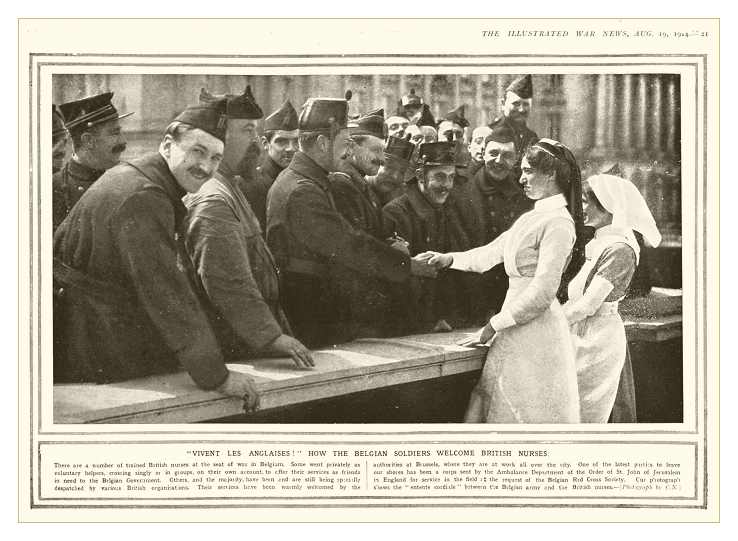
From the book
The Soul of the War
by Philip Gibbs, Journalist 1915

Nurses
The women in their field kit, so feminine though it included breeches, gave a grace to those wayside halts, and gave to dirty men the chance of little courtesies which brought back civilization to their thoughts, even though life had gone back to primitive things with just life and death, hunger and thirst, love and courage, as the laws of existence. The man who had a corkscrew could command respect. A lady with gold-spun hair could gnaw a chicken bone without any loss of beauty. The chauffeurs munched solidly, making cockney jokes out of full mouths and abolishing all distinctions of caste by their comradeship in great adventures when their courage, their cool nerve, their fine endurance at the wheel, and their skill in taking heavy ambulances down muddy roads with skidding wheels, saved many men's lives and won a heartfelt praise. Little groups of Belgian soldiers came up wistfully and lingered round us as though liking the sight of us, and the sound of our English speech, and the gallantry of those girls who went into the firing-lines to rescue their wounded.
"They are wonderful, your English ladies," said a bearded man. He hesitated a moment and then asked timidly: "Do you think I might shake hands with one of them?"
I arranged the little matter, and he trudged off with a flush on his cheeks as though he had been in the presence of a queen, and graciously received.
The Belgian officers were eager to be presented to these ladies and paid them handsome compliments. I think the presence of these young women with their hypodermic syringes and first-aid bandages, and their skill in driving heavy motor-cars, and their spiritual disregard of danger, gave a sense of comfort and tenderness to those men who had been long absent from their women-folk and long-suffering in the bleak and ugly cruelty of war. There was no false sentiment, no disguised gallantry, in the homage of the Belgians to those ladies. It was the simple, chivalrous respect of soldiers to dauntless women who had come to help them when they were struck down and needed pity.
Women, with whom for a while I could call myself comrade, I think of you now and marvel at you ! The call of the wild had brought some of you out to those fields of death. The need of more excitement than modern life gives in time of peace, even the chance to forget, had been the motives with which two or three of you, I think, came upon these scenes of history, taking all risks recklessly, playing a man's part with a feminine pluck, glad of this liberty, far from the conventions of the civilized code, yet giving no hint of scandal to sharp-eared gossip. But most of you had no other thought than that of pity and helpfulness, and with a little flame of faith in your hearts you bore the weight of bleeding men, and eased their pain when it was too intolerable. No soldiers in the armies of the Allies have better right to wear the decorations which a king of sorrow gave you for your gallantry in action.